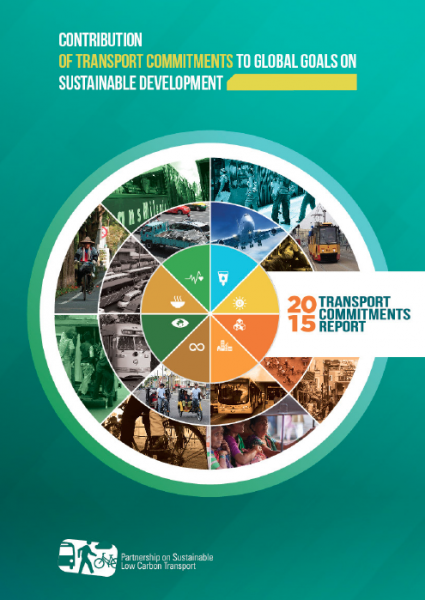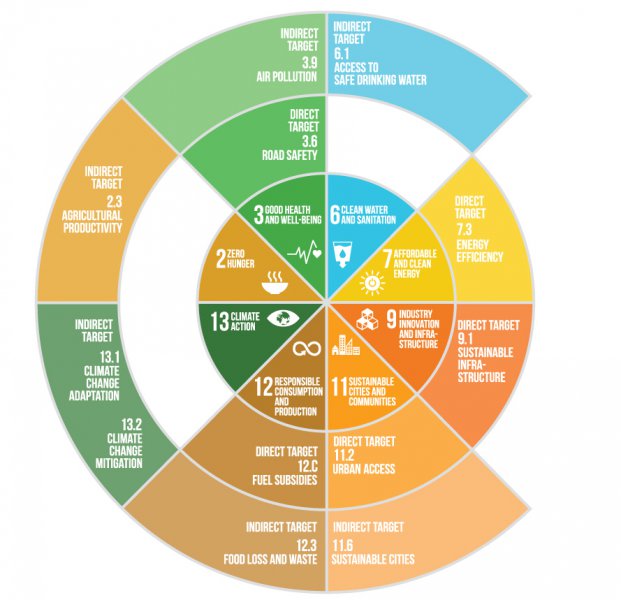 “Sustainable Transport matters when it comes to improving people’s lives.” This, together with: “The transport sector is taking important action to address the two key global policy processes of 2015: sustainable development and climate change” are major findings of the 2015 SLoCaT Transport Commitments Report.
“Sustainable Transport matters when it comes to improving people’s lives.” This, together with: “The transport sector is taking important action to address the two key global policy processes of 2015: sustainable development and climate change” are major findings of the 2015 SLoCaT Transport Commitments Report.
In September 2015, SLoCaT has released the second status report: Contribution of Transport Commitments to the Global Goals on Sustainable Development. The 2015 report analyzes the contribution that voluntary transport commitments are making to the Global Goals on Sustainable Development that will guide global action on development in the next 15 years. This analysis shows strong linkages between the transport commitments and the post-2015 development agenda, which can provide further impetus to the transport sector to further implementation of these commitments.
A global expansion of sustainable transport infrastructure and services is fundamental to the realization of sustainable development and climate change goals. 2015 is a critical year for these global processes, with two parallel processes to set out quantified targets and indicators to guide the directions for sustainable development and climate change action in the next 15 years: the Post-2015 Development Agenda to be finalized with the adoption of 17 Sustainable Development Goals (SDGs) in September 2015 and an anticipated global agreement on climate change expected to be reached in December 2015.
Sustainable transport plays a critical, cross-cutting role to facilitate the achievement of a wide range of economic, social and environment-oriented SDGs, and any attempt to achieve reductions in greenhouse gas (GHG) emissions that are required to maintain a two-degree scenario (2DS) without active involvement from the transport sector is destined to fall short.

Transport Targets of the Global Goals on Sustainable Development
Thus, it is clear that progress toward transport commitments made by the transport sector in the context of the 2012 United Nations Conference on Sustainable Development (Rio+20) as well as Secretary General Ban Ki-moon’s 2014 Climate Summit will determine transport’s ability to contribute to sustainable development and climate change goals from now until 2030.
The commitment process began with the United Nations Conference on Sustainable Development (Rio+20) in 2012, when SLoCaT helped to develop the first set of voluntary transport commitments to complement the formal negotiated outcome of the conference. This was followed by a second set of commitments in 2013 focusing largely on the measurement of sustainable transport initiatives. In 2014, SLoCaT helped to convene key members of the global transport community in support of Secretary General Ban Ki-moon’s Climate Summit, which triggered a new set of climate change-focused voluntary transport commitments. Now, in the lead up to the COP21 conference in December 2015, SLoCaT (at the invitation of the Lima Paris Action Agenda) is helping to advance a group of emerging commitments on low carbon transport.
Much progress has been made since we published the first status report on voluntary commitments – Creating Universal Access to Safe, Clean and Affordable Transport – in 2013. Since then, the number of core commitments has doubled to 34, and the number of organizations involved in implementing the commitments has increased to more than 100. Significantly, all but one of the commitments are still active and undertaking crucial actions to scale up sustainable transport infrastructure and services, and supportive policies and tools.
You can download the full text of the report here.














